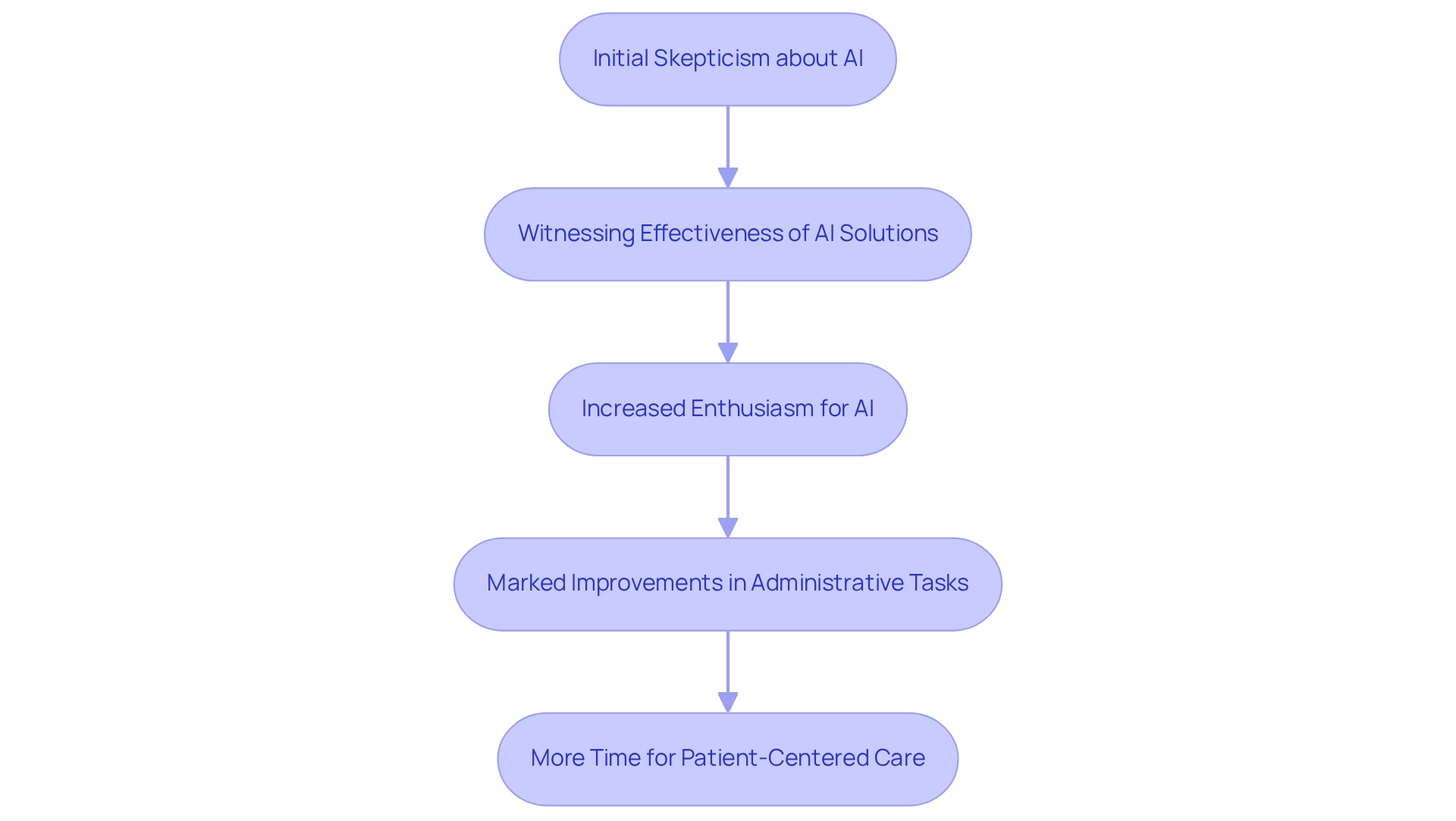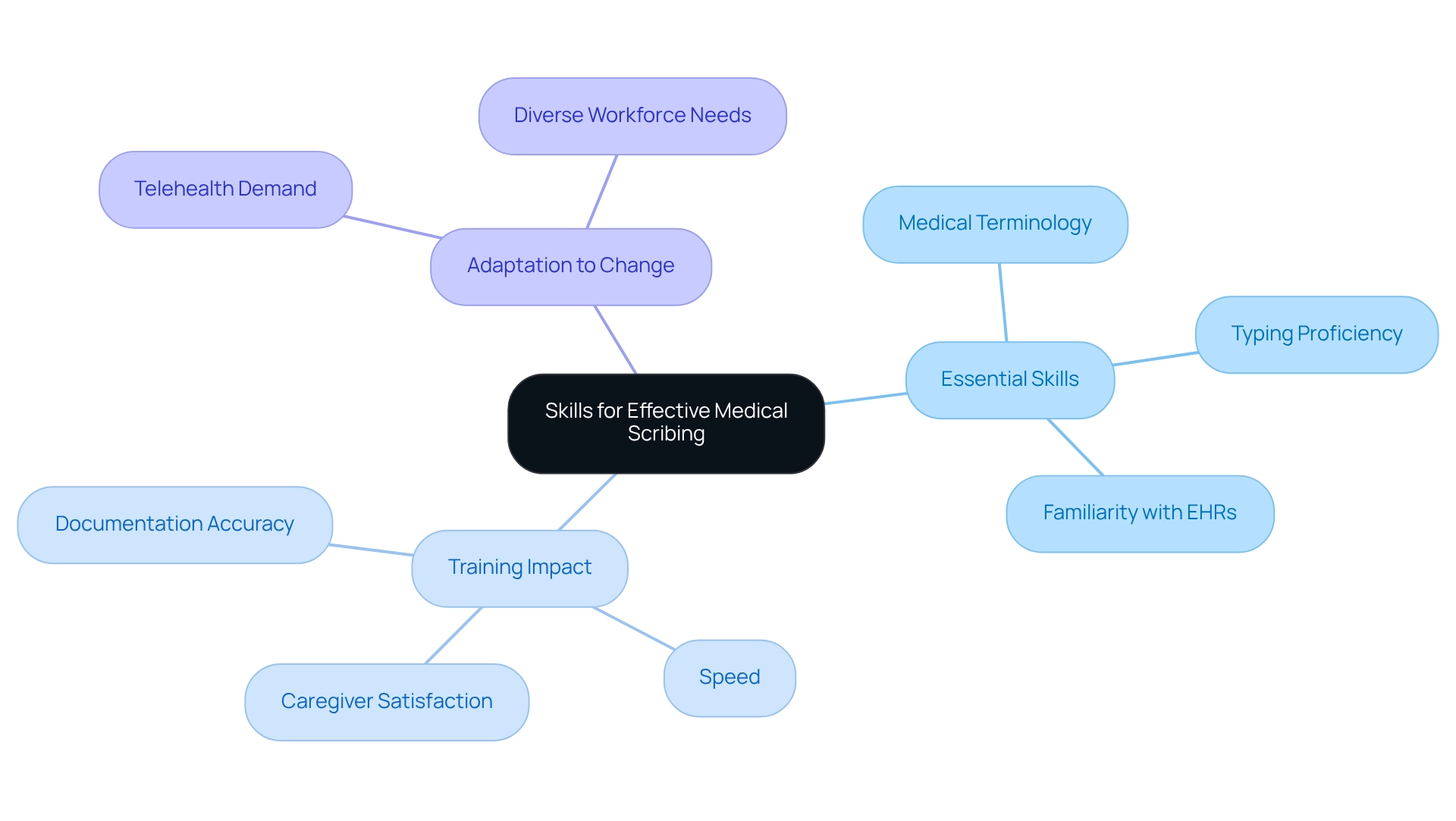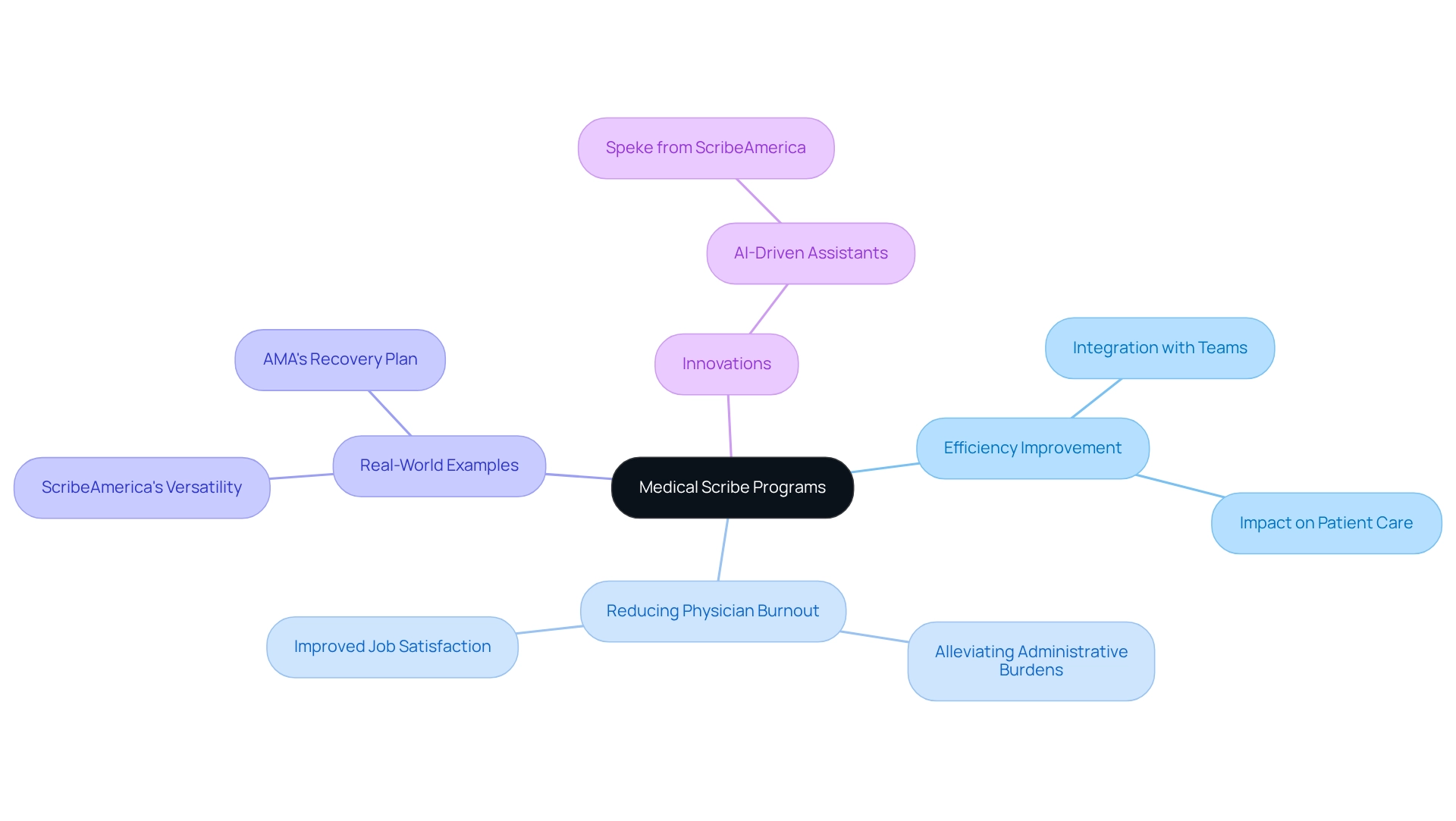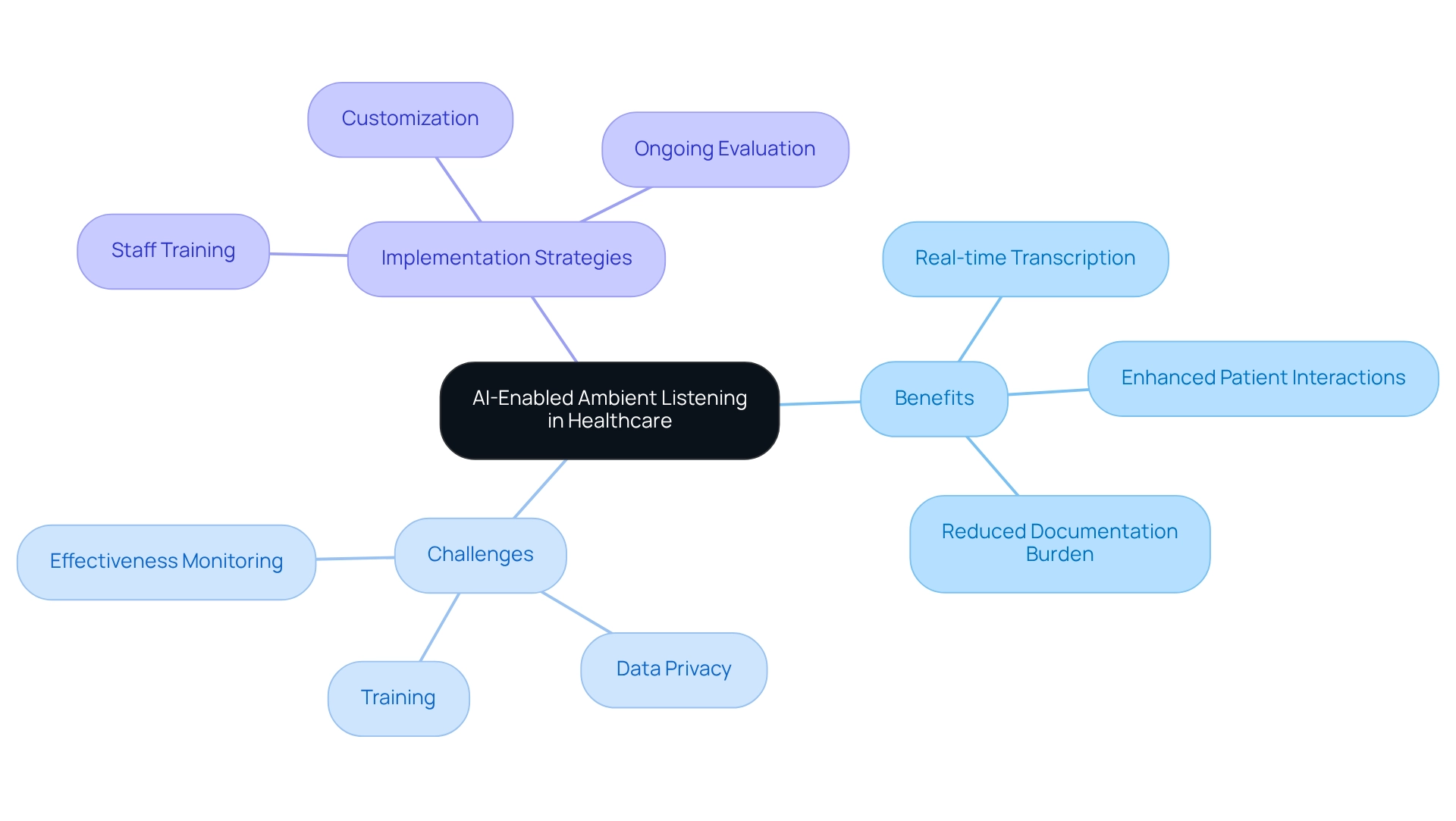Overview
Healthcare providers often face overwhelming emotional challenges due to the demands of their roles. With administrative tasks like documentation, scheduling, and medical record management consuming valuable time, it becomes increasingly difficult for clinicians to focus on what truly matters: patient care.
Health scribe solutions offer a compassionate response to these burdens. By automating these tasks, they not only enhance healthcare efficiency but also allow clinicians to devote more attention to their patients. Imagine the relief of being able to engage more fully with those you care for, knowing that the administrative side is taken care of.
The integration of AI-driven tools stands out as a beacon of hope. Not only do they reduce clinician burnout, but they also foster improved patient interactions and elevate the overall quality of care. The benefits of adopting health scribe services are significant, creating a more nurturing environment for both providers and patients.
As we move forward, consider how these solutions could transform your practice. Embracing health scribe services could be the key to reclaiming your time and enhancing the care you provide. Let's work together to create a healthier, more supportive healthcare experience.
Introduction
In the rapidly evolving landscape of healthcare, many providers face overwhelming administrative burdens that can detract from their primary focus: patient care. How often do these tasks leave little room for the meaningful interactions that truly matter? Fortunately, AI-powered solutions are emerging as transformative tools, streamlining administrative tasks and enhancing the quality of care. By automating documentation processes and utilizing dedicated medical scribes, these innovative technologies significantly lighten the load on healthcare providers. This shift allows them to devote more time to what they cherish most—connecting with patients on a personal level.
As organizations navigate the complexities of modern healthcare delivery, embracing these intelligent systems not only improves operational efficiency but also nurtures a more compassionate, patient-centered approach to care. Imagine a healthcare environment where providers can focus on their patients without the constant distraction of paperwork. This article explores the various AI-driven solutions currently reshaping healthcare, highlighting their profound impact on both providers and patients. Together, we can address the challenges and seize the opportunities that lie ahead, fostering a more supportive and effective healthcare experience for everyone involved.
CosmaNeura: Streamline Administrative Tasks with AI-Powered Solutions
In the demanding world of healthcare, the role of a health scribe can help alleviate the administrative burdens that weigh heavily on providers. CosmaNeura offers a comprehensive set of AI-driven solutions designed to alleviate these pressures, optimizing tasks like client intake, appointment scheduling, medical record management, and triage. By automating these processes, CosmaNeura significantly reduces the time clinicians spend on paperwork, allowing them to redirect their focus toward what truly matters: , much like a health scribe would facilitate.
Initially, many physicians were understandably skeptical about incorporating intelligent support systems into their practice. Concerns about trust and the potential impact on human interaction loomed large. However, after witnessing the effectiveness of these tools firsthand, a significant percentage of physicians expressed newfound enthusiasm for intelligent assistance. Hospitals reported marked improvements in administrative task completion and a substantial reduction in time spent on routine work.
As Mike Sutten, CTO at Innovaccer, insightfully noted, 'As technology assumes more administrative responsibilities, health scribes allow medical professionals to devote additional time to comprehending and addressing their clients.' This shift not only enhances operational efficiency but also ensures that care remains at the forefront of their mission. By adopting AI, healthcare providers can uphold the principles that guide their practice, ultimately fostering a more compassionate approach to patient care.
Imagine a future where healthcare professionals can focus entirely on their patients, free from the shackles of administrative tasks. With CosmaNeura’s solutions, this vision can become a reality. Embrace the change and explore how AI can transform your practice, allowing you to provide the care your patients deserve.

DeepScribe: Enhance Documentation Accuracy with AI-Driven Scribing
Healthcare providers often face overwhelming administrative burdens that can help alleviate, allowing them to deliver more compassionate care. DeepScribe utilizes advanced AI technology to transform interactions into precise clinical notes in real-time. This innovative method significantly reduces the likelihood of errors commonly associated with manual documentation, thereby enhancing the accuracy of medical records. By automating essential tasks such as documentation, appointment scheduling, and medical record management, a health scribe allows service providers to devote more time to their clients. This shift not only strengthens the therapeutic relationship but also improves overall patient care. However, it's important to acknowledge the resistance some medical professionals feel towards AI adoption, often driven by concerns about reliability and job security.
Yet, initiatives like Sutter Health's implementation of voice-powered documentation illustrate how AI can alleviate physician burnout by streamlining burdensome tasks. Imagine a world where documentation is precise and efficient—this is the reality that a health scribe like DeepScribe offers, boosting operational efficiency and enabling medical professionals to focus on delivering high-quality patient care.
It is essential to recognize that medical professionals play a crucial role in training and overseeing AI-driven assistants, ensuring that this technology aligns with clinical needs. Additionally, omission errors remain a frequent challenge in clinical documentation, underscoring the ongoing issues that AI aims to address. Through these advancements, AI-driven solutions like health scribe and DeepScribe are not just transforming medical service delivery; they are addressing challenges and enhancing patient-centric care. Consider how integrating such technology could alleviate some of your burdens and improve the care you provide.
ScribeAmerica: Optimize Patient Interaction with Specialized Scribe Services
ScribeAmerica recognizes the emotional challenges healthcare providers face, particularly when it comes to managing client interactions. By offering dedicated documentation services as a health scribe, we alleviate some of the administrative burdens that can detract from the quality of patient care. Imagine being able to focus entirely on those you serve, knowing that every interaction is being logged in real-time by a health scribe. This shift not only enhances the quality of care but significantly boosts satisfaction among individuals.
In fact, over 75% of individuals reported that their doctor's computer use was not disruptive. This indicates that having a health scribe present fosters a more engaged and valued experience. Studies reveal that when a health scribe is involved, physicians tend to be more focused and provide better education, leading to improved communication during clinic visits. A notable study titled 'Patient Communication and Scribes' found that many individuals felt the physician was more attentive and offered superior education when a health scribe was present. This is further supported by results highlighting the positive relationship between record-keeping services and health outcomes for individuals.
Furthermore, out of 1,681 surveys distributed concerning physician satisfaction, an impressive 87.7% were submitted. This underscores the effectiveness of in enhancing provider experiences. As medical providers can see more clients and streamline their workflows, the financial advantages become clear, ultimately boosting overall practice efficiency.
Real-world examples illustrate how specialized documentation services not only improve interactions with individuals but also contribute to a more fulfilling healthcare experience. With expert insights emphasizing the role of health scribes in easing non-medical burdens, it becomes evident that ScribeAmerica's approach is vital in transforming care dynamics. Healthcare providers looking to implement specialized documentation services can consider training staff to effectively utilize health scribes. This ensures that both client care and practice efficiency are maximized, allowing for a more compassionate and effective healthcare environment.
Ambula.io: Improve Physician Efficiency with Dedicated Medical Scribes
Healthcare providers often face overwhelming administrative burdens that can detract from their ability to deliver compassionate care. Ambula.io understands these challenges and provides health scribes who play a crucial role in enhancing physician efficiency. By managing documentation and administrative tasks, health scribes enable physicians to increase their patient volume and dedicate more time to direct care activities.
Imagine the relief of reducing the documentation burden. This support not only enhances overall practice efficiency but also fosters a more rewarding work atmosphere for health scribes and other medical professionals. Research shows that including specialized medical assistants can lead to significant improvements in job satisfaction and well-being among healthcare providers. For instance, those utilizing AI technologies, including dedicated assistants, have reported increased job satisfaction, indicating a positive relationship between administrative support and staff morale.
Consider the eligibility criteria for emergency physicians: they can enroll if they are consultants and permanently employed for at least one shift a week. This highlights the growing recognition of the importance of dedicated support in clinical settings. A case study titled "Well-Being and Satisfaction Improvements" assessed the overall well-being and job satisfaction of medical providers in relation to AI technologies. It demonstrated that those who utilized a health scribe experienced significant improvements in their work experience.
Furthermore, Lisa Rotenstein, MD, MBA, MSc, noted that the study group primarily consisted of asynchronous documentation users, underscoring the importance of dedicated personnel in enhancing efficiency. As medical practices progressively embrace , they observe a notable rise in client volume, facilitating a more efficient and effective health service delivery system.
This trend underscores the vital function that committed medical assistants fulfill in reshaping the medical field, ultimately benefiting both providers and patients alike. How might your practice benefit from such dedicated support? Embracing this change could lead to a more fulfilling experience for everyone involved.
Indeed.com: Develop Skills for Effective Medical Scribing
Indeed.com provides invaluable resources for aspiring health scribes, assisting them in developing essential skills such as medical terminology, typing proficiency, and familiarity with electronic health records (EHRs). These skills are crucial, as they directly impact the efficiency and accuracy of documentation processes in healthcare settings. By offering comprehensive training, medical organizations can not only enhance care for individuals but also boost satisfaction among caregivers.
Have you ever considered how effective training programs can lead to significant improvements in documentation accuracy and speed? This, in turn, fosters better clinical outcomes. For example, CosmaNeura's AI platform significantly alleviates administrative burdens, allowing medical providers to devote more time to patient care and enhancing their job satisfaction. By automating labor-intensive tasks like appointment scheduling and medical record management, CosmaNeura's solutions empower physicians to reclaim precious time, ultimately transforming the delivery of medical services.
As the sole organization dedicated to developing AI solutions for the billion-dollar faith-oriented medical sector, CosmaNeura underscores the importance of investing in training resources for medical note-takers. Moreover, as Michael Williams, Ph.D., emphasizes, the rise of telehealth technology has heightened the demand for proficient health scribes. With the evolving demographics and educational backgrounds of medical support staff, it is essential for medical providers to adapt their training programs to meet the needs of a diverse workforce. This adjustment is vital in ensuring high standards of care in our ever-changing environment.
Consider the impact of these changes on your practice. Are you ready to invest in training that not only supports your team but also enhances the quality of care you provide? Together, we can navigate these challenges and create a more .

Dittotranscripts.com: Understand the Unique Roles of Scribes vs. Transcriptionists
Dittotranscripts.com sheds light on the vital roles of health scribes and transcriptionists, which are essential in enhancing medical workflows. Imagine the relief for medical assistants as they use a health scribe to engage in real-time recording of client interactions during appointments, granting instant access to precise client details. In contrast, health scribes play a crucial role in converting recorded audio into written reports after the fact. Understanding this distinction is key for healthcare providers, as the choice between these two roles, particularly the role of a health scribe, can significantly influence workflow efficiency and the quality of care.
Statistics reveal that records supplied by clerks can lead to improved outcomes for individuals and more efficient workflows. For instance, a subgroup examination of assistant effectiveness showcased consistent advantages across various clinical environments, demonstrating that assistants can enhance throughput without compromising care quality. Furthermore, medical professionals have noted that integrating a health scribe into their practices not only simplifies documentation procedures but also allows them to dedicate more time to client interactions. This ultimately fosters a more compassionate care atmosphere. As , PharmD, from the Department of Emergency Medicine, observed, "Scribes also decreased the length of stay among clinics but did not influence length of stay or time to disposition in the ED setting."
However, it is crucial to consider that future research should evaluate potential harms related to the use of transcriptionists, such as safety concerns for individuals. Recognizing the distinct contributions of record keepers and transcriptionists is essential for healthcare organizations aiming to enhance operational efficiency and patient satisfaction. By leveraging the strengths of both roles, providers can cultivate a more effective documentation strategy that aligns with their clinical objectives.
OHSU.edu: Leverage Medical Scribe Programs for Enhanced Practice Efficiency
OHSU.edu highlights the crucial role of medical documentation programs in improving practice efficiency. Many healthcare providers face overwhelming administrative burdens that can detract from the quality of patient care. By integrating skilled health scribes into medical teams, practices can significantly streamline documentation processes, alleviating some of this pressure on doctors. This integration not only fosters better interactions with patients but also plays a vital role in reducing physician burnout, a growing concern in the medical community.
Recent statistics reveal that medical documentation programs enhance efficiency, allowing providers to focus more on patient care rather than administrative tasks. For example, the American Medical Association has acknowledged the impact of electronic health record (EHR) systems on physician burnout and has launched initiatives to address this pressing issue. Real-world examples illustrate that practices employing medical assistants experience higher job satisfaction among clinicians and improved patient outcomes.
Notably, ScribeAmerica serves over 80 specialties, demonstrating the versatility of across various healthcare settings. Dr. Rotenstein noted that "Forty percent stated it assisted them in being more efficient and subsequently reduced the time they spent on the EHR after hours and on weekends." This underscores the tangible benefits of integration. Furthermore, innovations like Speke, an AI-driven digital assistant from ScribeAmerica, showcase how technology is evolving to support integration and enhance patient care.
As the healthcare landscape continues to change, the importance of incorporating health scribe programs becomes increasingly evident. They promote a more efficient and compassionate delivery system, ultimately benefiting both providers and patients alike. How can your practice embrace these solutions to improve care and reduce stress? The journey toward a more supportive healthcare environment starts with understanding the value of these programs.

AMA Association: Transform Healthcare with AI-Enabled Ambient Listening
The AMA Association recognizes the profound impact that AI-enabled ambient listening technology can have in healthcare. Imagine a solution that not only records but also transcribes provider conversations in real-time, allowing clinicians to dedicate their full attention to patient care instead of getting bogged down by administrative tasks. This innovative approach alleviates the documentation burden through key features like real-time transcription and seamless integration with electronic health records, ultimately enhancing the quality of clinician-patient interactions and significantly boosting overall patient satisfaction.
Consider the current statistics: AI writers prove especially beneficial during lengthy appointments, with transcripts sometimes reaching up to 50 pages. However, the successful integration of ambient listening technology is not without its challenges. It necessitates comprehensive training for medical personnel, collaboration with compliance teams to safeguard data privacy, and ongoing monitoring to evaluate its effectiveness in clinical settings. underscores that pilot programs aim to uncover the best approaches for the effective and safe use of health scribe technology, supporting clinicians’ workflows. Medical administrators and IT managers, too, should reflect on strategies for smooth implementation. This includes:
- Comprehensive training for staff
- Customization of solutions tailored to specific practices
- Ongoing evaluation of the technology's effectiveness
As medical professionals increasingly embrace these tools, the focus remains steadfast on enhancing care quality while maintaining operational efficiency. This highlights the necessity for benchmarking and monitoring processes to assess the impact of AI tools on medical outcomes. By harnessing generative AI and creative solutions, the medical sector can address significant challenges, such as administrative burdens and fragmented communication, ultimately improving individual experiences and revolutionizing the delivery of care.

Nature.com: Enhance Scribing Processes with AI Innovations
Recent advancements in AI technology are transforming the role of health scribes in , as highlighted by insights from Nature.com. These innovations not only enhance the precision of documentation but also simplify workflows, allowing providers to dedicate more time to caring for individuals. However, face emotional challenges regarding these changes. There is considerable opposition to innovation, particularly from physicians concerned about preserving the standard of care and nurturing client interactions.
Conventional accelerators often fail to support medical startups, exacerbating this resistance. Yet, by implementing [AI-driven solutions](https://cosmaneura.com), practices can address these concerns and significantly reduce the hours spent on administrative tasks. This shift leads to improved operational efficiency, allowing healthcare providers to focus on what truly matters—their patients. For instance, OSF HealthCare's deployment of the virtual assistant Clare has notably enhanced patient access to self-service options while reducing costs in contact center operations. This showcases the potential of AI to elevate patient satisfaction and operational effectiveness.
Furthermore, with 978 customized machine learning features integrated into clinical workflows by Healthfirst, the impact of AI on documentation accuracy and workflow efficiency is becoming increasingly evident. These features directly contribute to enhancing the precision of documentation and optimizing workflow processes. As medical organizations continue to explore these technologies, it is crucial to move beyond pilot programs, as noted by Accenture, to fully realize the return on investment that AI can offer.
The partnership between human expertise and machine intelligence is poised to shape the future of medical documentation. Incorporating AI advancements into health scribe processes is essential while addressing the legitimate concerns of medical professionals. Together, we can navigate these changes and improve the overall healthcare experience for both providers and patients.
RWJBarnabas Healthcare Careers: Explore Growing Opportunities for Medical Scribes
RWJBarnabas Careers highlights the growing opportunities for health scribes within the healthcare field, recognizing the emotional challenges healthcare providers face. As the demand for effective documentation increases, medical providers find themselves increasingly reliant on health scribes to manage data entry and documentation tasks. This shift not only alleviates the administrative burden on clinicians but also addresses the urgent need for accurate electronic health records (EHR) management, especially with the help of , as AI-driven solutions continue to reshape medical service delivery.
The current job market for medical note-takers is thriving, with significant growth anticipated by 2025. The rising complexity of medical documentation, along with the transition to digital records and the integration of AI technologies, has spurred a demand for health scribes who are skilled at navigating these systems. Industry experts emphasize that the role of medical assistants is crucial in enhancing workflow efficiency and reducing physician burnout. Collaborating with a health scribe allows providers to focus more on patient care and less on administrative responsibilities. Dr. Linda Roney notes, "There is a considerable demand for nurses nationwide, in various environments," underscoring the broader workforce needs within the medical field and the essential role of medical assistants.
To thrive in this evolving role of a health scribe, aspiring medical assistants should cultivate a blend of skills, including:
- A keen attention to detail
- Proficiency in medical terminology
- Familiarity with EHR systems
- Effective communication skills
Real-world examples illustrate the promising career paths available in this field. As telehealth continues to revolutionize medical services, the demand for health scribes is expected to rise, opening new opportunities for individuals entering the profession. The case study titled 'Impact of Telehealth on Nursing Careers' highlights the importance of adaptability and continuous learning in the health scribe role, as the shifting landscape presents both challenges and opportunities. Moreover, CosmaNeura's transformative AI-enabled solution enhances the quality of care for patients while embodying Catholic healthcare values, showcasing how technology can support healthcare efficiency and improve patient outcomes.
Conclusion
The integration of AI-powered solutions in healthcare is truly transforming the landscape of patient care and administrative efficiency. By automating tasks such as documentation, appointment scheduling, and medical record management, tools like CosmaNeura, DeepScribe, and Ambula.io are alleviating burdens that often detract from meaningful patient-provider interactions. This shift not only enhances operational efficiency but also allows healthcare professionals to focus more on compassionate, patient-centered care, which is essential in today’s demanding healthcare environment.
Moreover, the use of specialized scribe services has shown to significantly improve documentation accuracy and patient satisfaction. As seen with ScribeAmerica and similar services, the presence of dedicated scribes fosters a more engaged experience for patients and enables providers to deliver high-quality education and communication during visits. Have you noticed the positive correlation between the use of scribes and improved health outcomes? This emphasizes the critical role of these professionals in enhancing the overall healthcare experience.
As the healthcare sector continues to evolve, embracing AI-driven innovations is not merely a trend; it is a necessary step toward a more efficient and compassionate system. With the projected growth in the demand for medical scribes and the ongoing development of AI technologies, healthcare providers are positioned to redefine their workflows. By prioritizing training and integration of these solutions, the industry can address the challenges of administrative burdens while nurturing a more effective, patient-focused care model.
The future of healthcare lies in leveraging the synergy between technology and human expertise. Together, we can ultimately transform care delivery for the better. Are you ready to embrace these changes and enhance your practice?




